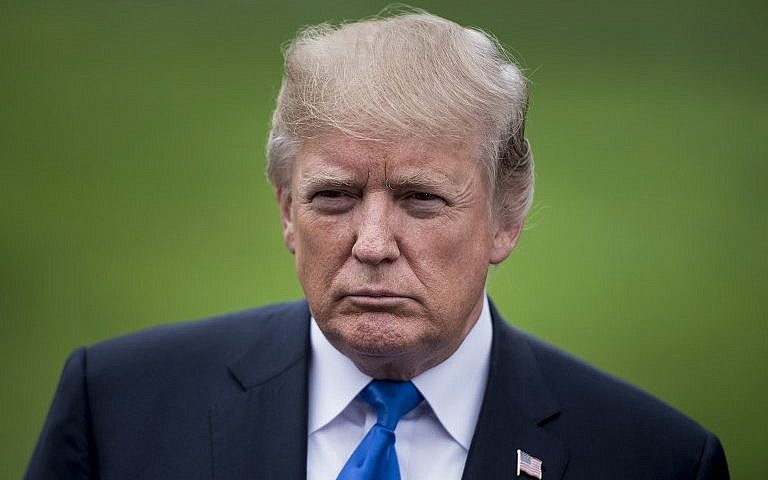London– Reactions to the announcement of US President on Iran’s nuclear deal are still surfacing, and despite Germany and UK’s confirmation that they will stand committed to the nuclear deal, both countries stated they are “concerned by the possible implications” of Trump’s refusal to certify it and reiterated the importance of thwarting Iran’s destabilizing actions in the region.
Britain and Germany agreed on Sunday they remained committed to the nuclear deal with Iran even after US’ decision to decertify the agreement.
“They agreed the UK and Germany both remained firmly committed to the deal,” spokeswoman of UK Prime Minister Theresa May said in a statement after a call between the PM and German Chancellor Angela Merkel.
The spokeswoman stated that the two officials also agreed that the international community needed to continue to come together to “push back against Iran’s destabilizing regional activity, and to explore ways of addressing concerns about Iran’s ballistic missile program.”
US Secretary of State Rex Tillerson said Sunday the US is trying to stay in the Iran nuclear deal while hoping to achieve more from it.
During an interview with CNN, Tillerson said the US is open to the possibility of seeking another agreement.
“We’re going to work with our European partners and allies to see if we can’t address these concerns,” he added.
Tillerson said Iran had committed technical violations of the deal, but that the agreement was structured in a way to give Iran significant time to remedy its violations.
Tillerson explained that Trump demanded a broader strategy on Iran, adding that the US was focused on more issues than simply Iran’s potential nuclear ambitions, citing the nation’s ballistic missile program and support for groups adversarial to the US throughout the Middle East.
“What the President wants is a more comprehensive strategy,” Tillerson confirmed.
He said the US was working to address issues it had with the multilateral agreement and anticipated that might require a new deal.
During several occasions, Tehran confirmed it refuses re-negotiations on its nuclear programs.
Earlier last week, Head of Iran’s Islamic Revolutionary Guards Corps Mohamad Ali Jafari announced that Iran believes that many issues in the region can be solved outside the negotiations’ table.
When asked if he agrees with Defense Minister James Matis, Tillerson said he agrees with the minister that they shouldn’t rush the Congress to impose new sanctions on Iran.
Meanwhile, UN Ambassador Nikki Haley said the US will stay in for now, as it looks for ways to help the American people “feel safer” by going to Congress.
“I think what you’re going to see is the president’s going to work very closely with Congress to try and come up with something that is more proportionate, something that does make sense for the US to agree to,” Haley told NBC.
Haley said that Iran should not become the next North Korea.
“So what this says to North Korea is, ‘Don’t expect us to engage in a bad deal. And also, if at any point we do come up with something, expect us to follow through with it. Expect us to hold you accountable. You’re not just going to have a free-for-all,” she stated.
For his part, Iran’s Foreign Minister Mohammed Javad Zarif said that nobody else will trust any US administration to engage in any long-term negotiation.
During an interview with CBS, Zarif reiterated that this is not a bilateral treaty between Iran and the United States, adding that the US is a permanent member of the Security Council and if it’s not going to uphold a resolution, that not only it voted for but it sponsored, then the credibility of the institution that the United States considers to be very important would be at stake.
Zarif warned that this administration is withdrawing from everything and people cannot trust anymore the word of the US.
“I believe the Trump administration is closing its eyes on the realities of our region. We believe it would be important for the United States for the Trump administration to exercise a reset in its cognitive disorder with regard to our region,” Zarif told CBS.
Speaking in an interview with state TV late Saturday, Zarif also said, “Trump’s last night remarks on Joint Comprehensive Plan of Action (JCPOA), are inconsistent with articles 26, 28 and 29 of the treaty.
“The action plan bans the US administration officials from making negative comments on JCPOA,” he said.
The deal is required to be implemented “in good faith” and the US should “refrain from re-introducing or re-imposing” sanctions related to Iran’s nuclear programme.
Zarif said he lodged nine complaints to the Joint Commission and will write a new one concerning Trump’s statements.
Iranian President Hassan Rouhani responded to Trump’s statements saying no president could single-handedly revoke an international document backed by UN. He added that Trump’s decision made the US more isolated than ever.
The future of the agreement is at stake, now that the Congress has 60 days to decide whether it will re-impose sanctions on Iran or not.
Head of the Atomic Energy Organization of Iran, Ali Akbar Salehi declared that the country would no longer abide by the Additional Protocol of the Non-Proliferation Treaty if the nuclear deal fell apart.
“Without the nuclear agreement its application is meaningless,” Salehi told state television.
He warned that Iran could very quickly return to the production of highly enriched uranium if the US reimposed sanctions.
“If one day, the leaders of the country conclude that the nuclear agreement is no longer to the benefit of the country and decide to resume 20 percent enrichment we can do so within four days,” he said.
